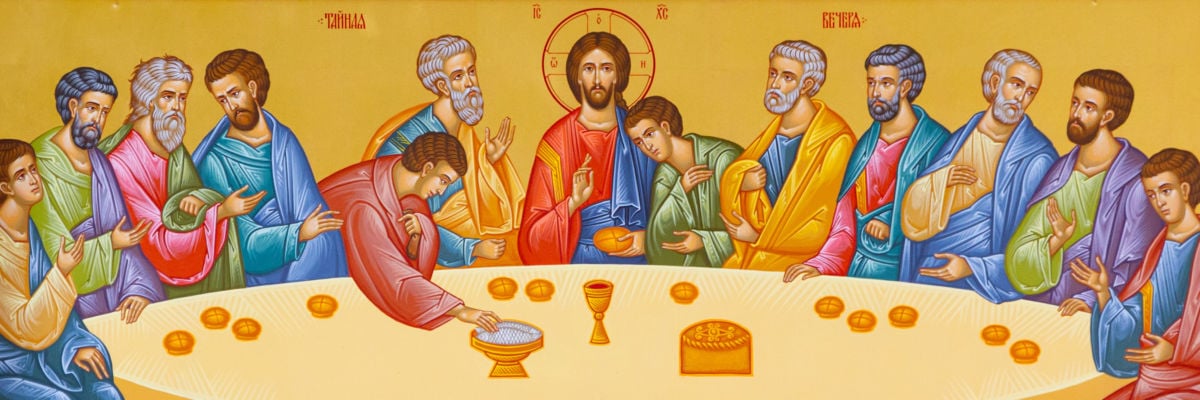
Homily for the Sixth Sunday of Easter, 2021
This is my commandment: love one another as I love you.
No one has greater love than this,
to lay down one’s life for one’s friends.
You are my friends if you do what I command you.
I no longer call you slaves,
because a slave does not know what his master is doing.
I have called you friends,
because I have told you everything I have heard from my Father.
It was not you who chose me, but I who chose you
and appointed you to go and bear fruit that will remain,
so that whatever you ask the Father in my name he may give you.
This I command you: love one another.-John 15:12-15
Is this really the whole truth? “Greater love has no man than this, that a man lay down his life for his friends”? I mean, wouldn’t it be an even greater love to lay down one’s life for one’s enemies? After all, St. Paul tells us, “God proves his love for us in that while we were yet sinners Christ died for us” (Rom. 5:8).
Why does Our Lord express himself this way? Did he not say “Love your enemies?” It is obvious to our Christian intuition that the Savior loved his enemies and gave his life for them. Is this not then the greatest form of love, greater even that love for friends?
There is a deep, supernatural reason why the answer to this question is “no”—why Our Lord does not say that there is no greater love than to lay down one’s life for one’s enemies.
The reason is love, divine and fraternal charity; indeed friendship itself, a most privileged form of love. Commenting upon this passage, St. Thomas tells us some deeply revealing and consoling truths about the way the Savior loves us:
Christ did not lay down his life for us his enemies as we remain his enemies, but that he might make us his friends. That is to say, even if we were not friends as those loving him, nonetheless we were his friends as loved by him.
Remember, we were just told in the epistle reading that love consists in this: not that we have loved God, but that he has loved us first. Our Lord loves us utterly gratuitously and effectively. His love makes us love him, makes us his friends.
Remember the Greek word in the Gospel for friend, philos, means “a lover” or “one who loves.” The same is true in Latin and Latin languages: amicus, ami, amigo, amico. And a deeper study shows that this is the original meaning of the root word for friend in English and German, and in Slavic languages as well.
Our Lord’s love for his friends is by way of attraction, by a drawing. He makes us love him and so become his friends. He does not love in any other way. In fact, he takes this kind of love to extremes. When Judas was in the act of betraying him in the garden with a kiss, our good, kind Redeemer called him “friend.”
His love creates, moves, stirs up love in us. Hearing his voice calling him by the name he gave his apostles in the Upper Room must have been a torture to Judas as he resisted the Lord’s drawing. How a soul resists this love is a mystery, but it remains true that Jesus only loves to make us his lovers. This is true of all the living, no matter how wicked they have become.
This kind of love for friends also gives us an insight into the depth of the Savior’s suffering for sinners, his friends. That’s what the Pharisees complained about: he was a “friend of sinners.” He was a friend to his enemies whom he loved to make them friends. Suffering for an estranged friend is painful indeed if he does not return our love. This kind of love for his friends caused his bloody sweat in his agony.
Now, Our Lord tells us that we must love one another as he has loved us. But how can we imitate so demanding a model? It is simple. He commands us to love our enemies, saying “Love your enemies, pray for those who persecute you.”
Notice he makes the command and then immediately shows how to begin to accomplish it. How can I love my enemy? By praying for him. Prayer for our neighbor is a spiritual work of mercy, a work of love. We, like Our Lord do not want the love of others except so that they and we can be united in the love of God. Praying for those who have offended us is a Christ-like work, showing a desire to make them friends in him.
Indeed “his commandments are not burdensome” as St. John, the beloved disciple, tells us. Begin today earnestly to pray for poor sinners who live like enemies of Christ, and for those who have sinned against you, so that you may be his friend as well! And then the Father will grant whatsoever you ask of him, as our divine Friend tells us.



